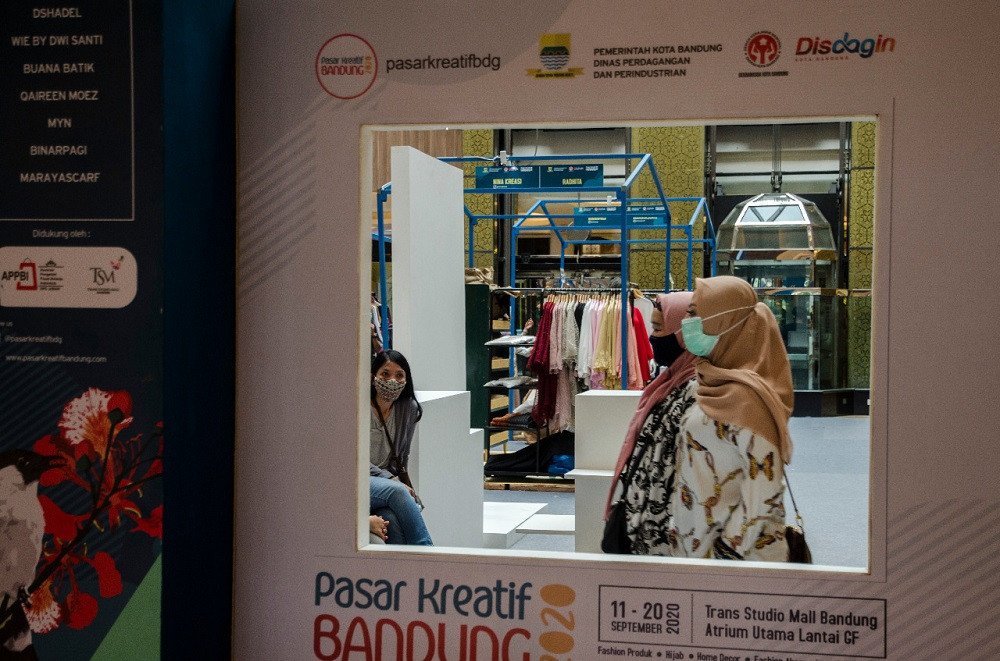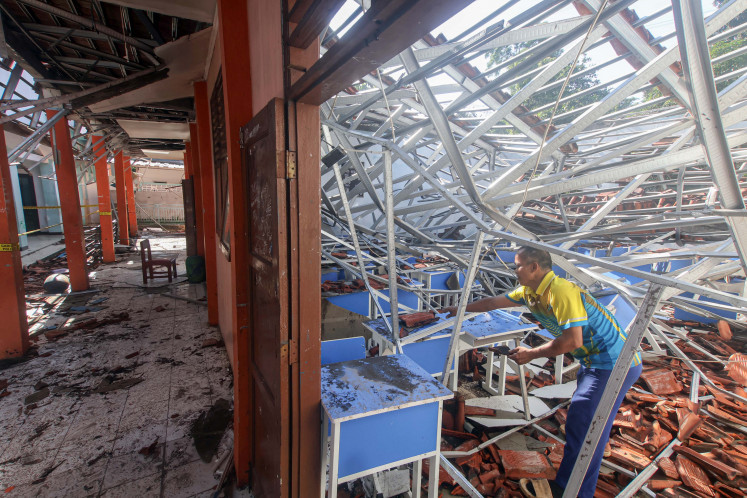Popular Reads
Top Results
Can't find what you're looking for?
View all search resultsPopular Reads
Top Results
Can't find what you're looking for?
View all search resultsThe long, winding road to economic recovery
Banks, instead of providing loans, have invested their cash in government bonds, which are safer but have lower returns.
Change text size
Gift Premium Articles
to Anyone
A
s people suffer the pain of the pandemic its economic shock, they hope the economic recovery will come soon. But this will depend on how the government responds to the spread of the virus and the weakening of the economy.
So far we’ve seen three types of government responses.
The first type is the China model, where a brutal lockdown was imposed soon after COVID-19 began to spread. The virus was quickly contained but at huge economic cost. The economy contracted by 6.8 percent in the first quarter but rapidly rebounded, growing 3.2 percent in the second quarter.
The second type of response is the United States model, where the federal government ignored the threat of virus and did not institute a nationally integrated and comprehensive response to the pandemic. President Donald Trump thought the virus would go away by itself, and he developed narratives that contradicted the opinions of health experts and scientists on the danger of the virus. The US has, as a result, suffered the highest number of cases and death in the world. Its economy is in tatters, having contracted by 5 percent in Q1 and by 33 percent in Q2, and unemployment is at a record high.
The third type of response is the Indonesian government model, consisting of denial and downplaying the impact of the pandemic early on, followed by half-hearted partial lockdowns with varying degrees of social restrictions. Of course, this has not worked. The virus has spread with ferocity, causing the nation’s gross domestic product (GDP) to contract by 5.3 percent in the second quarter, the first contraction in twenty-two years.
What was extraordinary about the second quarter GDP was that the GDP deflator fell by 1.9 percent. This is the first time in history that Indonesia has experienced a decline in its GDP deflator. This fall shows the extent of deflation in the economy.
Deflation can deter consumers from spending, especially from buying consumer durables and houses. And companies contemplating capital investment may prefer to remain on the sidelines until prices stop falling. According to economist Noriel Roubini (whose predictions of a financial crisis came true in 2008), the prolonged deflation could offset the impact of monetary stimulus, making monetary policy ineffective.
Bank Indonesia (BI) has poured trillions of rupiah into the financial system to ease the liquidity crunch caused by the pandemic. Yet bank credit has not been flowing. In July bank loans increased by only 1 percent year on year. Worse, working capital credit contracted by 1.7 percent, and credit to Micro Small and Medium Enterprises (MMSEs) – which are expected to play an important role in the economic recovery because of their size relative to GDP – fell by 0.5 percent, after having contracted by 0.4 percent in June. A contraction in bank credit is unprecedented, as far as we can remember.
Banks, instead of providing loans, have invested their cash in government bonds, which are safer but have lower returns. For them, offering loans is too risky in a distressed economy. In the months of May and June, commercial bank investment in bonds increased by Rp 143 trillion (US$9.8 billion) to about Rp 1 quadrillion from Rp 860 trillion. Commercial bank ownership of bonds rose to 36 percent, a significant increase from 20 percent in 2019.
In Indonesia, deflation, as reflected in the fall of the GDP deflator in the second quarter, was an indication that the collapse of demand was more severe than that indicated by the Consumer Price Index (CPI). The CPI covers only a basket of commodities, mainly food and services, while the GDP deflator covers a broader range of products and services produced by the domestic economy. Hence changes in the GDP deflator give a more realistic picture of the extent of the fall of aggregate demand in the economy.
Deflation continued in July and August, albeit at lower levels, but if this trend continues, it is possible the GDP deflator will decline again in third quarter.
This situation raises the question of whether the current fiscal stimulus will be adequate to counter the impact of deflation. The fiscal stimulus package, which is expected to lift demand, is not only still facing challenges in its implementation, it is also facing problems with its design and size. The program has been changed and modified several times because the government is not sure which combination of components will be most effective.
A program that is poorly designed is prone to ineffectiveness and waste. And it is not certain whether the Rp 204 trillion social safety net program will have a significant impact on demand in the approximately Rp 17.5 quadrillion Indonesian economy.
The poor and the newly unemployed have had to wait several months for the government to sort out the red tape and have experienced economic and social pain as a result. That pain will endure because the economic recovery will take longer than was previously expected.
Fighting the spread of the coronavirus is like fighting the spread of a forest fire. The government should have a powerful firefighting engine, and it has to be deployed forcefully. And the flames should be extinguished once and for all, lest the flickers turn into wildfires again. The war against global pandemic is a world war phenomenon. Tim Geithner, president Obama’s secretary of the treasury during the financial crisis said, “We cannot fight World War III with George Washington’s army.”
That is why it is important that monetary stimulus, fiscal stimulus and efforts to combat the pandemic be deployed forcefully. And they should act together in tandem, because if one weakens, it will undermine the others. This should be avoided because the road to recovery will be long and bumpy given the uncertainty of the global economy and in the availability of a vaccine.
***
The writer is an economist and a commissioner at a publicly listed oil and gas services company.










